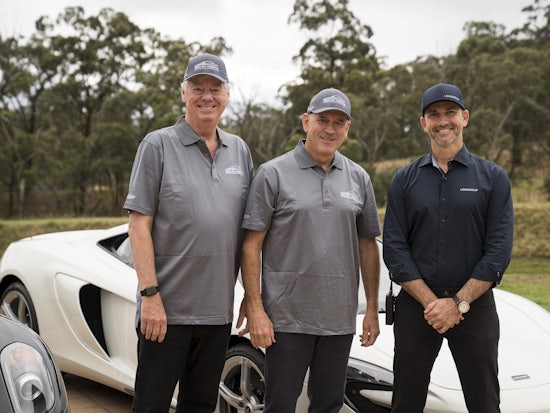Motoring enthusiasts put their foot down to drive out dementia
Increasing dementia research was the driving force behind an inaugural motoring event in New South Wales that kicked off on Friday 27 October.

Phil Cave, Richard Grellman and Luke O’Neill together with some of the luxury vehicles (Source: CHeBA)
Drive Out Dementia was organised by three senior executives who, through the testing of luxury vehicles on the purpose-built private road, raised money for dementia research.
Among those behind the event include Richard Grellman, Chairman of IPH Limited and AMP Foundation; Phil Cave, Chairman of Anchorage Capital; and Luke O’Neill, McLaren’s former Australian Brand Ambassador and founder of Longroup.
Also a part of the Centre for Healthy Brain Ageing (CHeBA)’s The Dementia Momentum initiative, Mr Grellman says the corporate contributions would go to advancing large-scale, ‘big data’ research into age-related brain disorders.
“This collaboration is about embracing corporate social responsibility,” Mr Grellman says.
“Together our goal is to bring together an executive network and provide an opportunity for the corporate sector to invest firmly in social change.
“Our hope is that the corporate participants recognise the value of funding research into prevention to change the future of dementia and benefit all Australians.”
For Mr Cave, Drive Out Dementia is not the first time he has been involved in donating and raising funds for dementia research. Mr Cave has previously demonstrated his commitment to supporting research when he and wife Judy Harris became founding members of The Dementia Momentum, donating $100,000 to the initiative.
“The social and economic burden of this disease is unmistakable,” he says.
“The coupling of an ageing workforce and a rapid increase in dementia cases necessitates corporate social responsibility alongside government research funding.”
Professor Perminder Sachdev from CHeBA is one of the researchers dedicated to looking into age-related cognitive disorders and has welcomed the alliance with the Drive Out Dementia initiative saying he feels ‘encouraged’ by it.
He adds that with significant developments in neuroscience over the past decade, there is considerable hope that we may be in a position to prevent and treat age-related disorders like Alzheimer’s disease.
“However, we need much more significant investment in research to expedite results,” he says.
“We also need more research across the full spectrum of the disease beyond drug treatments, to include prevention strategies in early and mid-life to reduce modifiable risk factors associated with dementia, as well as effective end-of-life care for patients and their families.”
Donations and contributions from the day’s events are still being finalised with a final figure expected to be reached within a month.























